-
 Bitcoin
Bitcoin $113900
-1.39% -
 Ethereum
Ethereum $3517
-4.15% -
 XRP
XRP $3.009
1.59% -
 Tether USDt
Tether USDt $0.9997
-0.04% -
 BNB
BNB $766.8
-1.41% -
 Solana
Solana $164.6
-2.38% -
 USDC
USDC $0.9998
-0.02% -
 TRON
TRON $0.3277
0.65% -
 Dogecoin
Dogecoin $0.2023
-1.67% -
 Cardano
Cardano $0.7246
0.05% -
 Hyperliquid
Hyperliquid $38.27
-4.77% -
 Sui
Sui $3.528
-0.52% -
 Stellar
Stellar $0.3890
-0.73% -
 Chainlink
Chainlink $16.16
-2.69% -
 Bitcoin Cash
Bitcoin Cash $539.9
-4.38% -
 Hedera
Hedera $0.2425
-2.00% -
 Avalanche
Avalanche $21.71
-0.97% -
 Toncoin
Toncoin $3.662
5.73% -
 Ethena USDe
Ethena USDe $1.000
-0.02% -
 UNUS SED LEO
UNUS SED LEO $8.964
0.35% -
 Litecoin
Litecoin $107.7
2.33% -
 Shiba Inu
Shiba Inu $0.00001223
-0.40% -
 Polkadot
Polkadot $3.617
-0.97% -
 Uniswap
Uniswap $9.052
-2.49% -
 Monero
Monero $295.1
-3.79% -
 Dai
Dai $0.9999
0.00% -
 Bitget Token
Bitget Token $4.315
-1.85% -
 Pepe
Pepe $0.00001060
0.11% -
 Cronos
Cronos $0.1342
-2.72% -
 Aave
Aave $256.0
-0.87%
What to do if NFT has poor liquidity? How to buy and sell digital assets quickly?
To improve your NFT's liquidity, list it on popular marketplaces like OpenSea or Blur, set competitive prices, and promote your listing on social media and NFT communities.
Jun 15, 2025 at 09:21 am
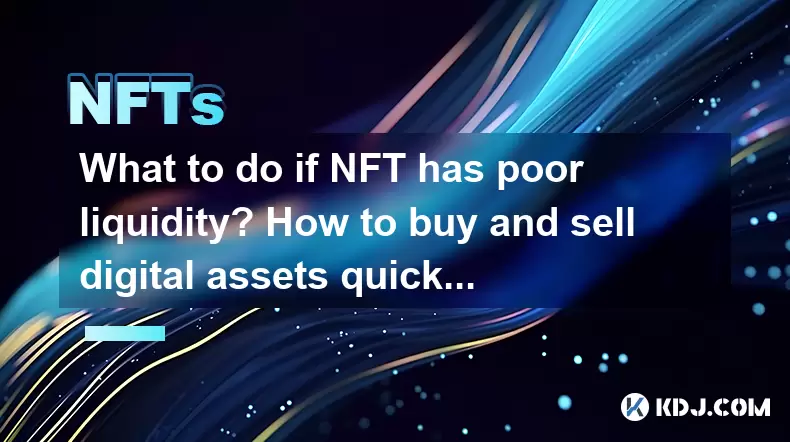
Understanding the Problem of NFT Liquidity
When an NFT has poor liquidity, it means that the asset is not easily tradable or convertible into cash without affecting its market price. This issue is common in the NFT market, especially for digital collectibles, rare artworks, and other unique tokens that lack consistent buyer interest. Poor liquidity can lead to long waiting times before a sale happens, and sometimes even result in assets being sold at significantly lower prices than expected.
In the crypto world, liquidity depends on several factors including the popularity of the collection, the platform used, and the overall market sentiment. For example, Blue-chip NFTs such as Bored Ape Yacht Club (BAYC) or CryptoPunks tend to have better liquidity compared to smaller or newer collections.
How to Improve the Liquidity of Your NFT
To improve the liquidity of your NFT, you must understand where and how to list it effectively. The following steps are essential:
- Choose the right marketplace: Platforms like OpenSea, LooksRare, and Blur are among the most popular for trading NFTs. Each offers different tools and user bases.
- Set competitive pricing: Research similar items in the same collection and ensure your listing is priced attractively but not too low to devalue your asset.
- Use promotional tools: Some platforms allow users to boost visibility through bidding incentives or cross-promotion features.
These actions help increase exposure and make your NFT more attractive to buyers, thereby improving its chances of a quick sale.
Step-by-Step Guide to Selling NFTs Quickly
If your goal is to sell your NFT quickly, follow these steps carefully:
- Connect your wallet: Use MetaMask or another compatible wallet to log in to your preferred NFT marketplace.
- Select the NFT you want to sell: Navigate to your wallet and choose the specific token you wish to put up for sale.
- Set a fixed price or auction format: Decide whether you want to offer your NFT at a set price or allow bidding.
- List the NFT with gas fees: Pay the required gas fee to publish your listing. Be mindful of network congestion to avoid high costs.
- Promote your listing: Share your NFT on social media, Discord communities, or NFT forums to attract potential buyers.
Each of these steps plays a critical role in ensuring your digital asset reaches a wider audience, increasing the likelihood of a fast transaction.
Buying NFTs with Low Liquidity: What You Should Know
When considering the purchase of an NFT with low liquidity, buyers should be cautious. These assets may appear undervalued but could remain difficult to resell in the future. Key considerations include:
- Assessing the project’s fundamentals: Look into the team behind the NFT, its utility, and roadmap.
- Checking trading volume and floor price trends: If the collection has consistently low activity, it might indicate weak demand.
- Evaluating personal interest: If you're buying for personal enjoyment rather than investment, liquidity becomes less of a concern.
By doing thorough research, buyers can avoid making costly mistakes while still supporting emerging creators and projects.
Alternative Methods to Trade Illiquid NFTs
For those struggling with illiquid NFTs, alternative trading methods can provide solutions:
- Peer-to-peer (P2P) trading: Direct negotiations with interested parties can bypass traditional marketplaces and speed up sales.
- Fractional ownership platforms: Services like Unic.ly or Fractional.art allow owners to split their NFTs into shares, enabling partial sales and attracting more investors.
- NFT lending and borrowing: Platforms such as BendDAO or NFTfi allow users to collateralize their NFTs for loans, providing liquidity without selling the asset.
These alternatives open new avenues for unlocking value from illiquid NFTs, though they come with their own risks and requirements.
Frequently Asked Questions
Q: Can I convert my NFT into ETH directly?
A: Yes, by listing your NFT for sale on a decentralized marketplace and setting the payment currency as ETH, you can receive ETH directly upon sale completion.
Q: Why do some NFTs never sell?
A: Several reasons include lack of marketing, poor artwork or design, unestablished project teams, or general disinterest in the collection.
Q: Is it safe to buy NFTs with low trading volume?
A: It can be risky due to potential difficulty in resale. Always evaluate the underlying value and community support before purchasing.
Q: How do I know if an NFT is truly rare?
A: Check the metadata, traits, and rarity score provided by platforms like Rarity.tools or OpenSea's filters to determine scarcity within a collection.
Disclaimer:info@kdj.com
The information provided is not trading advice. kdj.com does not assume any responsibility for any investments made based on the information provided in this article. Cryptocurrencies are highly volatile and it is highly recommended that you invest with caution after thorough research!
If you believe that the content used on this website infringes your copyright, please contact us immediately (info@kdj.com) and we will delete it promptly.
- Bitcoin, XRP, and the Price Drop Blues: What's Shakin' in Crypto?
- 2025-08-03 00:30:12
- Bank of America, Ripple, and RLUSD: A New Era in Digital Finance?
- 2025-08-03 00:30:12
- Bitcoin Strategy: Saylor's Not Hoarding, He's Building an Empire
- 2025-08-02 22:30:12
- Bitcoin Bloodbath: Macro Pressures and Liquidations Unleash Crypto Chaos
- 2025-08-02 22:30:12
- Tron, Cold Wallets, and Crypto Trends: What's Hot in the Market?
- 2025-08-02 23:10:12
- Bitcoin's Wild Ride: Davinci, Investors, and the $500K Dream
- 2025-08-02 23:50:12
Related knowledge
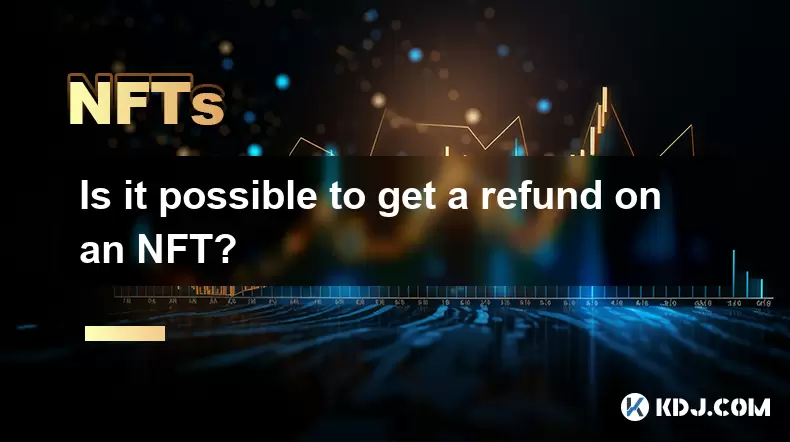
Is it possible to get a refund on an NFT?
Jul 21,2025 at 08:35pm
Understanding NFT Transactions and RefundsWhen you purchase an NFT (Non-Fungible Token), the transaction is typically recorded on a blockchain, making...
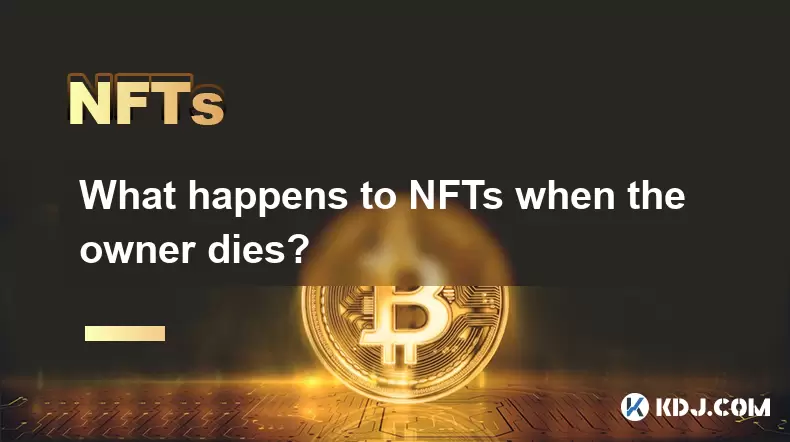
What happens to NFTs when the owner dies?
Jul 22,2025 at 02:43pm
Legal Ownership and Digital AssetsWhen an individual owns NFTs, the question of what happens to these assets upon their death is a pressing one. NFTs ...
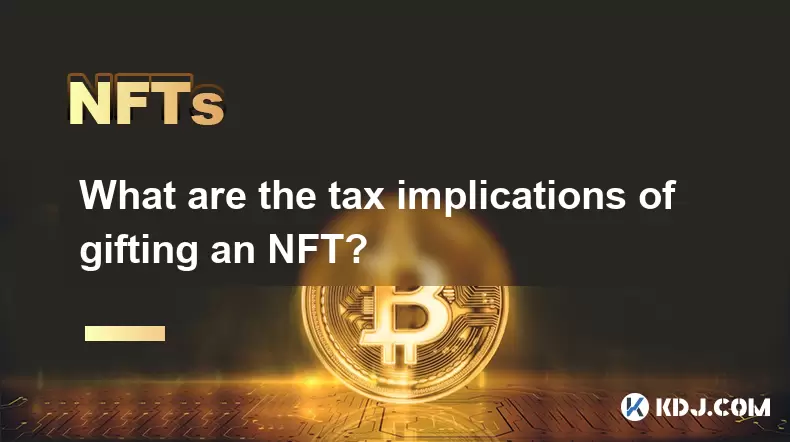
What are the tax implications of gifting an NFT?
Jul 19,2025 at 04:21am
Understanding the Basics of NFT GiftingGifting a Non-Fungible Token (NFT) involves transferring ownership from one individual to another without recei...
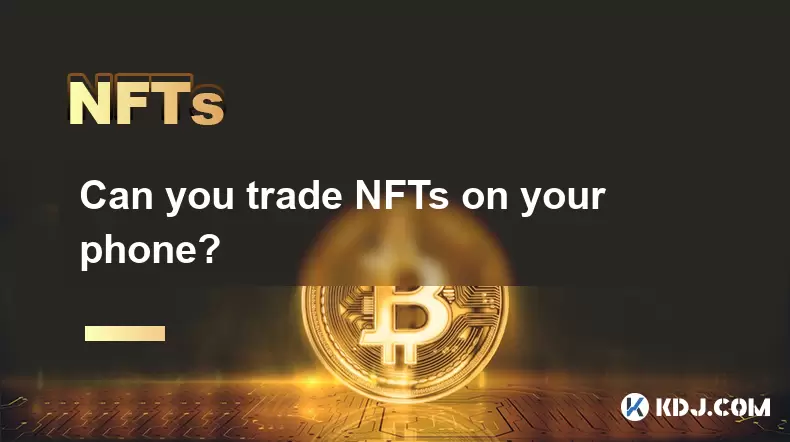
Can you trade NFTs on your phone?
Jul 18,2025 at 04:29am
Trading NFTs on Mobile DevicesYes, you can trade NFTs on your phone, and the process has become increasingly streamlined thanks to a variety of mobile...
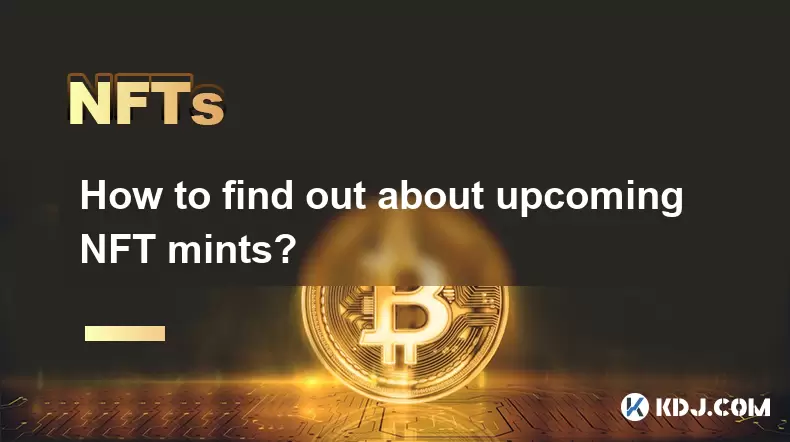
How to find out about upcoming NFT mints?
Jul 18,2025 at 11:50am
Exploring NFT Minting OpportunitiesUnderstanding the landscape of upcoming NFT mints is crucial for collectors, investors, and creators who wish to st...
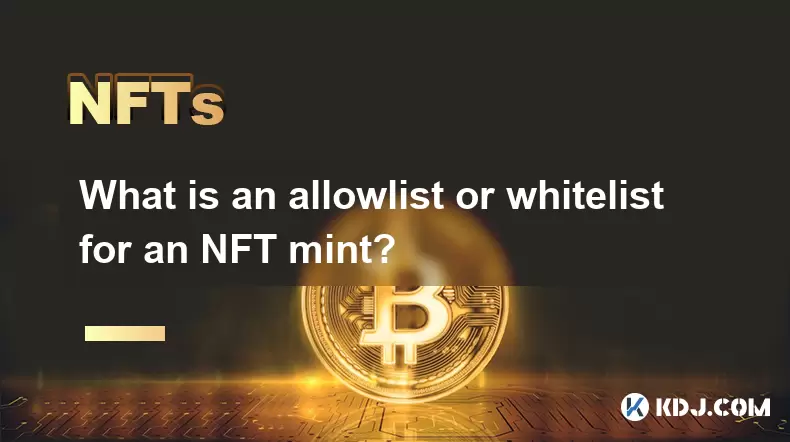
What is an allowlist or whitelist for an NFT mint?
Jul 20,2025 at 07:14pm
Understanding the Concept of an Allowlist for NFT MintingAn allowlist, also commonly referred to as a whitelist, is a mechanism used in the NFT mintin...

Is it possible to get a refund on an NFT?
Jul 21,2025 at 08:35pm
Understanding NFT Transactions and RefundsWhen you purchase an NFT (Non-Fungible Token), the transaction is typically recorded on a blockchain, making...

What happens to NFTs when the owner dies?
Jul 22,2025 at 02:43pm
Legal Ownership and Digital AssetsWhen an individual owns NFTs, the question of what happens to these assets upon their death is a pressing one. NFTs ...

What are the tax implications of gifting an NFT?
Jul 19,2025 at 04:21am
Understanding the Basics of NFT GiftingGifting a Non-Fungible Token (NFT) involves transferring ownership from one individual to another without recei...

Can you trade NFTs on your phone?
Jul 18,2025 at 04:29am
Trading NFTs on Mobile DevicesYes, you can trade NFTs on your phone, and the process has become increasingly streamlined thanks to a variety of mobile...

How to find out about upcoming NFT mints?
Jul 18,2025 at 11:50am
Exploring NFT Minting OpportunitiesUnderstanding the landscape of upcoming NFT mints is crucial for collectors, investors, and creators who wish to st...

What is an allowlist or whitelist for an NFT mint?
Jul 20,2025 at 07:14pm
Understanding the Concept of an Allowlist for NFT MintingAn allowlist, also commonly referred to as a whitelist, is a mechanism used in the NFT mintin...
See all articles

























































































